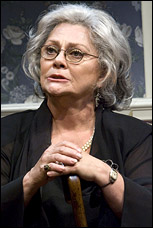
The consensus along the Rialto is that the quest for the 2008 Pulitzer Prize for Drama, far from being a horse race or open question, is nothing less than "a slam-dunk," in the words of one observer. All of the Broadway professionals informally surveyed for this article (most of whom chose to remain off the record) said that the trophy — arguably the most prestigious award given to a work of drama — is August: Osage County's to lose.
Since the Tracy Letts drama opened on Broadway on Dec. 4, 2007, theatre folk have talked of the triple-decker drama (three acts, three generations of one tortured family) as a classic award-getter. It's serious-minded; it's long; it examines the timeless American subject of family — all earmarks of those sorts of works that are frequently considered significant.
The contest is a stark contrast to the 2006 race, when no prize was given, and 2007, when the dark horse, Rabbit Hole, by David Lindsay-Abaire, emerged as the winner.
At this time last year, no one would have thought Chicago-based playwright Letts a contender for the Pulitzer. He was known for two potboiler genre plays, Killer Joe and Bug, both of which did well Off-Broadway, but didn't necessarily inspire critics to dust off a place for the writer in the theatre pantheon. His third play, Man From Nebraska was a Pulitzer contender. Still, when August: Osage County opened at Chicago's Steppenwolf Theatre Company in June 2007, many remarked that it constituted a wholly unexpected step up for Letts. Reviews compared it to Albee, O'Neill, Shepard and a host of other weighty writers. The story concerns the Weston family, a large Oklahoma clan with its share of problems. The family is handed a fresh peck of trouble and strife when patriarch Beverly up and disappears. Old wounds are torn open and new ones are unearthed, with the force of family exerting as irresistible a tidal pull on the various Westons as any ocean.
If the play wins, it would be the first Pulitzer for Letts. It would also be the first Pulitzer for a play that originated at Steppenwolf which, despite its vaunted reputation, has established itself as more of a breeding ground for great actors than as a launching pad for new plays. Lead producer Jeffrey Richards would also count the prize as the first Pulitzer-winning script he has produced in its original Broadway mounting. Letts and Richards declined to talk about the contest.
According to the Pulitzer website, the award is "for a distinguished play by an American author, preferably original in its source and dealing with American life" and "productions opening in the United States between January 1, 2007 and December 31, 2007 are eligible" (and opening does mean press opening, as opposed to simply beginning previews). This year is only the third year that the drama prize has used the calendar year, as opposed to the previous system of considering plays between March of one year and March of the next. A small committee of theatre critics and artists determines the nominated finalists, and the overall Pulitzer board picks a winner.
 |
||
| Elizabeth Ashley in the Off-Broadway run of Dividing the Estate |
||
| photo by James Leynse |
 |
||
| Hoon Lee in Yellow Face. |
||
| photo by Craig Schwartz |
*
The Pulitzer Prize — named for American journalist and publisher Joseph Pulitzer — was established in 1917, a stipulation of Pulitzer's will. The first Pulitzer Prize in Drama was awarded in 1918 to Jesse Lynch Williams' Why Marry?.
The complete list of Pulitzer Prize in Drama winners is listed below:
2007: Rabbit Hole by David Lindsay-Abaire
2006: No award
2004-05: Doubt, by John Patrick Shanley
2003-04: I Am My Own Wife, by Doug Wright
2002-03: Anna in the Tropics, by Nilo Cruz
2001-02: Topdog/Underdog, by Suzan-Lori Parks
2000-01: Proof, by David Auburn
1999-00: Dinner with Friends, by Donald Margulies
1998-99: Wit, by Margaret Edson
1997-98: How I Learned To Drive, by Paula Vogel
1996-97: No award
1995-96: Rent, by Jonathan Larson
1994-95: The Young Man From Atlanta, by Horton Foote
1993-94: Three Tall Women, by Edward Albee
1992-93: Angels in America: Millennium Approaches, by Tony Kushner
1991-92: The Kentucky Cycle, by Robert Schenkkan
1990-91: Lost in Yonkers, by Neil Simon
1989-90: The Piano Lesson, by August Wilson
1988-89: The Heidi Chronicles, by Wendy Wasserstein
1987-88: Driving Miss Daisy, by Alfred Uhry
1986-87: Fences, by August Wilson
1985-86: No award
1984-85: Sunday in the Park With George, by James Lapine and Stephen Sondheim
1983-84: Glengarry Glen Ross, by David Mamet
1982-83: 'night, Mother, by Marsha Norman
1981-82: A Soldier's Play, by Charles Fuller
1980-81: Crimes of the Heart, by Beth Henley
1979-80: Talley's Folly, by Lanford Wilson
1978-79: Buried Child, by Sam Shepard
1977-78: The Gin Game, by D.L. Coburn
1976-77: The Shadow Box, by Michael Cristofer
1975-76: A Chorus Line, by Michael Bennett, James Kirkwood, Nicholas Dante, Marvin Hamlisch and Edward Kleban
1974-75: Seascape, by Edward Albee
1973-74: No award
1972-73: That Championship Season, by Jason Miller
1971-72: No award
1970-71: The Effect of Gamma Rays on Man-in-the-Moon Marigolds, by Paul Zindel
1969-70: No Place To Be Somebody, by Charles Gordone
1968-69: The Great White Hope, by Howard Sackler
1967-68: No award
1966-67: A Delicate Balance, by Edward Albee
1965-66: No award
1964-65: The Subject Was Roses, by Frank D. Gilroy
1963-64: No award
1962-63: No award
1961-62: How To Succeed in Business Without Really Trying, by Abe Burrows, Willie Gilbert, Jack Weinstock and Frank Loesser
1960-61: All the Way Home, by Tad Mosel
1959-60: Fiorello!, by Jerome Weidman, George Abbott, Sheldon Harnick and Jerry Bock
1958-59: J.B., by Archibald MacLeish
1957-58: Look Homeward, Angel, by Ketti Frings
1956-57: Long Day's Journey Into Night, by Eugene O'Neill
1955-56: The Diary of Anne Frank, by Frances Goodrich and Albert Hackett
1954-55: Cat on a Hot Tin Roof, by Tennessee Williams
1953-54: The Teahouse of the August Moon, by John Patrick
1952-53: Picnic, by William Inge
1951-52: The Shrike, by Joseph Kramm
1950-51: No award
1949-50: South Pacific, by Richard Rodgers, Oscar Hammerstein II and Joshua Logan
1948-49: Death of a Salesman, by Arthur Miller
1947-48: A Streetcar Named Desire, by Tennessee Williams
1946-47: No award
1945-46: State of the Union, by Howard Lindsay and Russel Crouse
1944-45: Harvey, by Mary Chase
1943-44: No award
1942-43: The Skin of Our Teeth, by Thornton Wilder
1941-42: No award
1940-41: There Shall Be No Night, by Robert E. Sherwood
1939-40: The Time of Your Life, by William Saroyan
1938-39: Abe Lincoln in Illinois, by Robert E. Sherwood
1937-38: Our Town, by Thornton Wilder
1936-37: You Can't Take It With You, by Moss Hart and George S. Kaufman
1935-36: Idiot's Delight, by Robert E. Sherwood
1934-35: The Old Maid, by Zoe Akins
1933-34: Men in White, by Sidney Kingsley
1932-33: Both Your Houses, by Maxwell Anderson
1931-32: Of Thee I Sing, by George S. Kaufman, Morrie Ryskind, Ira and George Gershwin
1930-31: Alison's House, by Susan Glaspell
1929-30: The Green Pastures, by Marc Connelly
1928-29: Street Scene, by Elmer Rice
1927-28: Strange Interlude, by Eugene O'Neill
1926-27: In Abraham's Bosom, by Paul Green
1925-26: Craig's Wife, by George Kelly
1924-25: They Knew What They Wanted, by Sidney Howard
1923-24: Hell-Bent fer Heaven, by Hatcher Hughes
1922-23: Icebound, by Owen Davis
1921-22: Anna Christie, by Eugene O'Neill
1920-21: Miss Lulu Bett, by Zona Gale
1919-20: Beyond the Horizon, by Eugene O'Neill
1918-19: No award
1917-18: Why Marry?, by Jesse Lynch Williams
1916-17: No award











